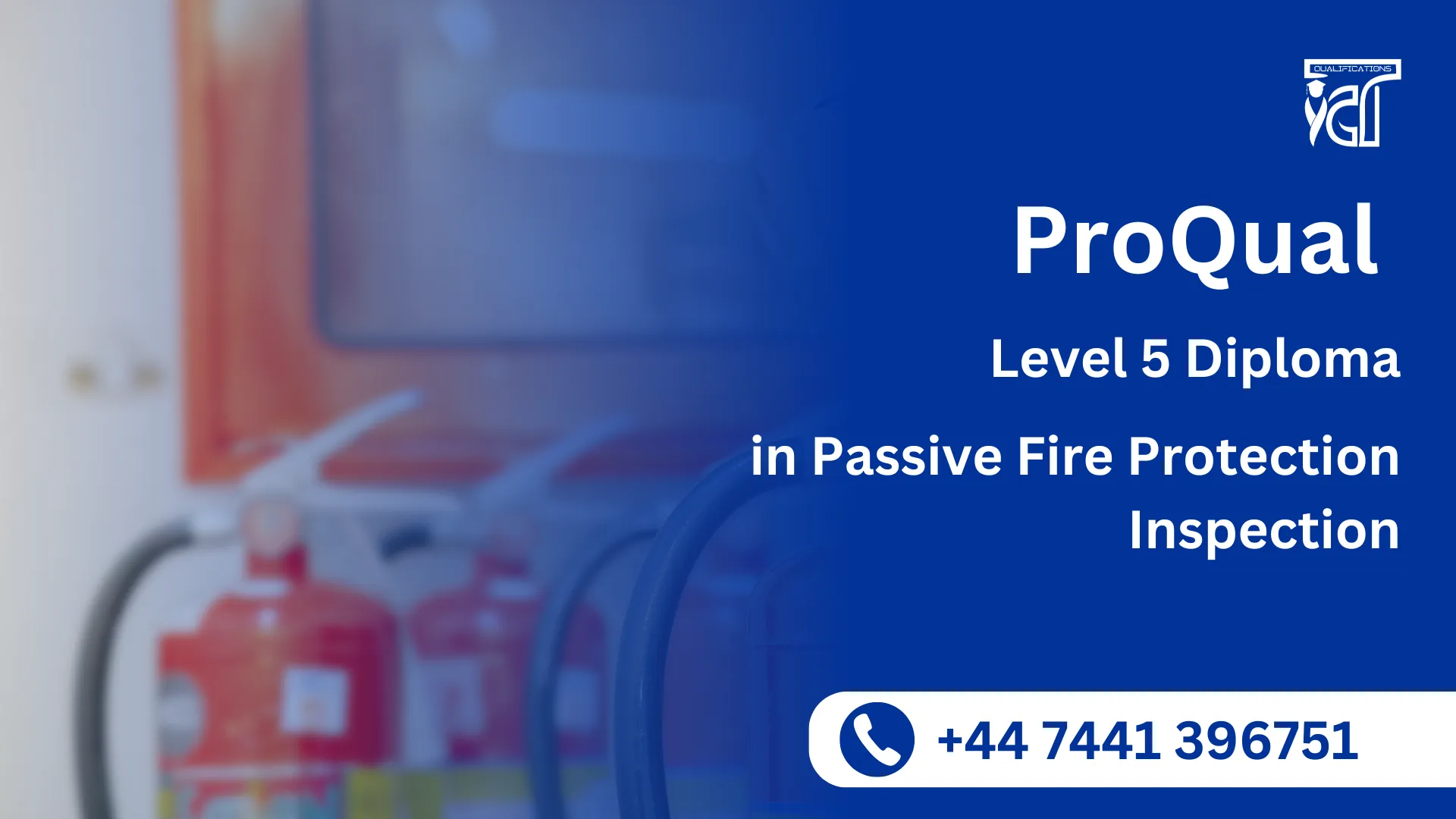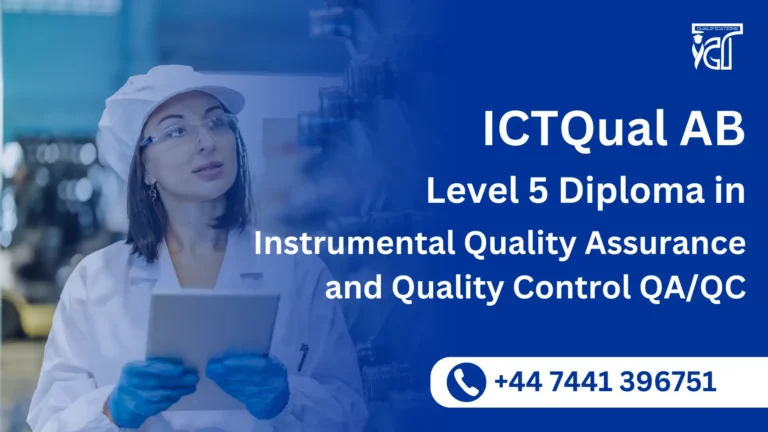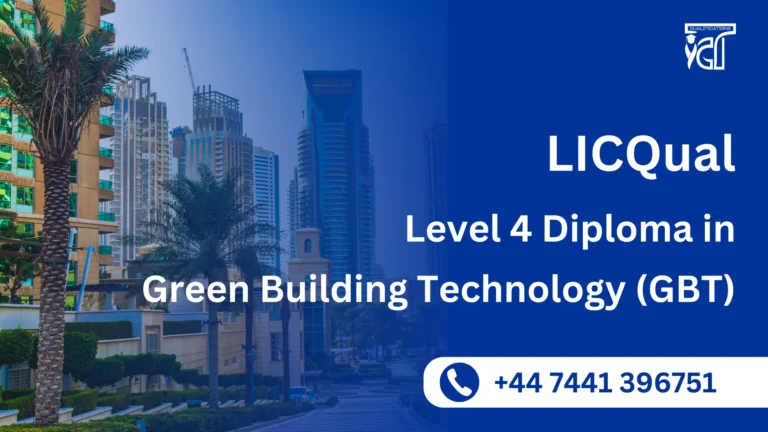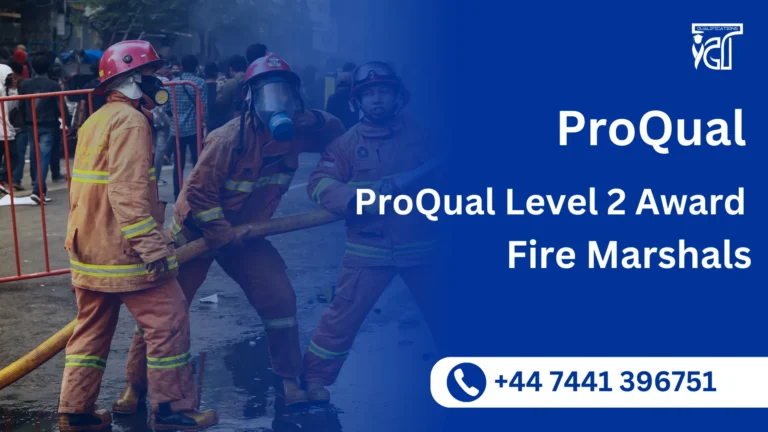In the construction and building maintenance sectors, fire safety is a top priority. With the increasing importance of ensuring safety in buildings, it’s crucial for professionals in the field to stay up-to-date with the latest standards and techniques. The ProQual Level 5 Diploma in Passive Fire Protection Inspection provides a comprehensive and recognized qualification for individuals aiming to specialize in fire protection inspections.
This Ofqual-regulated qualification is designed for those working in the passive fire protection (PFP) sector who want to deepen their knowledge and improve their expertise. This assignment-based course allows learners to gain practical, real-world experience without the pressure of exams. In this blog post, we will explore the details of the ProQual Level 5 Diploma in Passive Fire Protection Inspection, including its course structure, benefits, and how it can advance your career in the fire protection industry.
The ProQual Level 5 Diploma in Passive Fire Protection Inspection is designed for professionals working in fire safety and building construction. It focuses on providing individuals with the skills and knowledge to perform effective inspections of passive fire protection systems, ensuring compliance with national and international fire safety regulations.
This diploma is Ofqual-regulated, making it a nationally recognized qualification that enhances your professional credibility. The course is entirely assignment-based, meaning learners are assessed through practical assignments that directly relate to real-world fire protection scenarios.
The ProQual Level 5 Diploma in Passive Fire Protection Inspection is an essential qualification for those seeking to specialize in fire safety inspections. With an Ofqual-regulated structure and assignment-based learning, this qualification equips you with the skills and knowledge needed to ensure buildings are safe and compliant with fire protection standards. Whether you are looking to advance in your current role or transition into fire protection inspection, this course offers significant career benefits and professional growth opportunities.
ProQual Level 5 Diploma in Passive Fire Protection Inspection
The ProQual Level 5 Diploma in Passive Fire Protection Inspection, achieve the qualification candidates must achieve each of the mandatory units, plus a minimum of two of the optional units:
Mandatory Units – complete all units
| Sr# | Unit Title | Level | GLH |
|---|---|---|---|
| 1 | Building Control Site Inspection and Plan Assessment | 5 | 150 |
| 2 | Monitor Project Quality in Construction – Passive Fire Protection | 5 | 145 |
| Optional Units – complete a minimum of two units | |||
| Sr# | Unit Level | Level | GLH |
| 1 | Inspecting and Testing of Fire Resisting Door Installations | 3 | 30 |
| 2 | Inspecting and Testing of Fire Stopping Installations | 3 | 30 |
| 3 | Inspecting and Testing of Fire-Rated Ductwork and Damper Installations | 3 | 30 |
| 4 | Inspecting and Testing of Fire-Rated Steel Intumescent Coating Installations | 3 | 30 |
GLH (Guided Learning Hours) and TQT (Total Qualification Time) are terms commonly used in vocational qualifications to help define the amount of time a learner is expected to spend on their studies.
1. GLH (Guided Learning Hours)
GLH refers to the number of hours a learner spends being directly taught, supervised, or supported during their course. This includes the time spent in activities such as:
- Classroom instruction
- Practical workshops
- One-on-one tutoring or mentoring sessions
- Online learning sessions with tutor support
In other words, GLH represents the time that learners are actively engaged with their instructors or learning activities.
2. TQT (Total Qualification Time)
TQT represents the total amount of time a learner is expected to invest in completing a qualification, including:
- GLH (Guided Learning Hours): Time spent on direct learning, as explained above.
- Self-Directed Learning: This includes time spent on independent study, research, assignment completion, preparation for exams, and any other work the learner does outside of direct teaching hours.
TQT is a broader measure that includes all the time required to achieve the qualification. It helps learners and employers understand the overall commitment required for the qualification.
Key Differences Between GLH and TQT:
- GLH focuses on direct learning with guidance or supervision.
- TQT includes GLH as well as independent study time and other learning-related activities.
Example:
If a qualification has a TQT of 600 hours and a GLH of 250 hours, it means the learner should spend 250 hours in direct learning (classroom, online, or tutor-led sessions) and 350 hours on independent study or research.
ProQual Level 5 Diploma in Passive Fire Protection Inspection
Building Control Site Inspection and Plan Assessment
- . Be able to apply Building Regulations and The Fire Safety Order Implementation
- Understand building structures and their behaviours in a fire and apply the Building Regulations and Fire Safety Order
- . Be able to apply Building Regulations and Fire Safety Order Science of Materials
- Be able to apply the Building Regulations and The Fire Safety Order to fire safety situations
- Be able to complete a Building Control Residential Inspection related to Fire Safety
- Be able to apply Building Regulations and The Fire Safety Order Understanding Plans Specifications and Regulation 38 information
Monitor Project Quality in Construction – Passive Fire Protection
- Be able to monitor projects against agreed passive fire protection installation specifications.
- Be able to monitor projects against agreed quality standards in relation to passive fire protection
- Be able to monitor project compliance with legal and statutory requirements, in relation to passive fire protection.
- Understand how to monitor project compliance with legal and statutory requirements in relation to passive fire protection.
Inspecting and Testing of Fire Resisting Door Installations
- Understand the regulations and standards applying to fire doors.
- . Know the inspection procedure for fire door installations.
- Be able to inspect and test fire door installations.
Inspecting and Testing of Fire Stopping Installations
- Understand the regulations and standards applying to fire stopping.
- Know the inspection procedure for fire stopping installations.
- Be able to inspect and test fire stopping installations.
Inspecting and Testing of Fire-Rated Ductwork and Damper Installations
- Understand the regulations and standards applying to fire-rated ductwork and dampers
- Know the inspection procedure for fire-rated ductwork and damper installations.
- Be able to inspect and test firerated ductwork and damper installations.
Inspecting and Testing of Fire-Rated Steel Intumescent Coating Installations
- Understand the regulations and standards applying to fire-rated steel intumescent coatings.
- Know the inspection procedure for fire-rated steel intumescent coating installations.
Be able to inspect and test firerated steel
Benefits of the ProQual Level 5 Diploma in Passive Fire Protection Inspection
The ProQual Level 5 Diploma in Passive Fire Protection Inspection offers a comprehensive learning experience that equips professionals in the fire safety and construction sectors with essential skills to inspect and ensure the integrity of passive fire protection systems. This qualification brings numerous benefits for those looking to advance their careers in fire safety and construction. Here are the key benefits:
1. Ofqual-Regulated and Industry-Recognized
- The ProQual Level 5 Diploma is an Ofqual-regulated qualification, ensuring it meets the highest standards of quality and rigor. Being globally recognized, it boosts your credibility in the field of fire protection and provides employers with confidence in your qualifications.
2. Specialization in Passive Fire Protection
- This course allows you to specialize in passive fire protection (PFP) systems, which play a critical role in the safety of buildings. As passive fire protection systems are vital for compartmentation, firestopping, and containment, your expertise will be in high demand within the fire safety sector.
3. Assignment-Based Learning for Practical Application
- The course is entirely assignment-based, focusing on practical application rather than exams. This format enables you to develop real-world skills and apply your knowledge directly to your day-to-day responsibilities in fire protection inspections, enhancing your ability to deal with real-life scenarios confidently.
4. Enhanced Career Prospects
- Holding the ProQual Level 5 Diploma in Passive Fire Protection Inspection enhances your employability in roles such as Fire Protection Inspector, Building Inspector, Fire Safety Consultant, and Health and Safety Officer. It significantly increases your qualifications for more senior positions in the fire safety industry, opening doors to better job opportunities and career progression.
5. In-Depth Knowledge of Fire Protection Systems
- This diploma offers an in-depth understanding of passive fire protection systems and their critical role in building safety. You’ll learn how to properly inspect, assess, and maintain these systems to ensure they meet the necessary fire safety standards and regulations.
6. Improved Risk Management and Compliance
- The course emphasizes risk management and ensuring compliance with national and international fire safety standards. By developing these skills, you’ll be better equipped to identify potential risks, enforce fire safety regulations, and ensure that fire protection systems meet the required compliance and safety standards.
7. Increased Professional Credibility
- The ProQual Level 5 Diploma enhances your professional credibility by demonstrating your commitment to achieving high standards in fire safety. This formal qualification can set you apart from others in the industry, making you a valuable asset to employers and clients seeking expert fire protection inspectors.
8. Flexibility and Work-Life Balance
- The assignment-based format offers flexible learning, which allows you to complete the course at your own pace. This makes it ideal for professionals already working in the field of fire protection or construction who wish to further their qualifications without interrupting their work schedules.
9. Comprehensive Reporting and Inspection Skills
- The qualification trains you in producing detailed inspection reports and conducting thorough fire risk assessments. This ensures you are well-equipped to document your findings and communicate effectively with stakeholders, improving your decision-making and reporting abilities.
10. Health, Safety, and Environmental Focus
- With a strong emphasis on health, safety, and environmental considerations, the course ensures that you understand the impact of fire protection systems on overall safety and compliance. You’ll gain practical knowledge of the safety protocols necessary for inspecting fire protection systems in a wide range of environments.
11. Pathway for Further Specialization
- After completing the ProQual Level 5 Diploma, you have the opportunity to progress to higher-level fire safety qualifications or expand your expertise in related fields, such as fire safety engineering or advanced fire safety management. This makes the qualification an ideal foundation for career growth.
12. Improved Job Security
- As the construction and building maintenance sectors continue to prioritize fire safety, having this specialized qualification gives you a competitive edge in a growing industry. Employers increasingly seek qualified professionals to ensure their properties meet rigorous fire safety standards, improving your job security in the field.
The ProQual Level 5 Diploma in Passive Fire Protection Inspection is tailored for professionals who are looking to specialize in passive fire protection systems and enhance their expertise in fire safety inspections. This qualification is ideal for individuals with experience in fire safety, construction, or building maintenance who wish to advance their careers in fire protection inspection and compliance. Below are the key professionals who are the best fit for this course:
1. Fire Protection Inspectors
- Experienced Fire Protection Inspectors seeking to formalize and enhance their expertise in passive fire protection systems. This qualification will help you develop the advanced skills necessary to inspect and maintain these critical systems, ensuring they meet the required safety standards.
2. Fire Safety Engineers
- Fire Safety Engineers working in the design, implementation, and maintenance of fire protection systems. This course allows them to expand their knowledge in passive fire protection systems and gain practical inspection skills that can be applied in real-world scenarios.
3. Building Inspectors
- Building Inspectors who are responsible for ensuring construction projects comply with safety regulations. This course will equip them with a thorough understanding of passive fire protection systems and how to assess their effectiveness in maintaining building safety.
4. Health and Safety Officers
- Health and Safety Officers looking to deepen their knowledge of fire safety standards and regulations, especially regarding passive fire protection systems. This qualification helps them ensure compliance with fire safety regulations within workplaces and construction sites.
5. Site Managers and Construction Managers
- Site Managers or Construction Managers responsible for overseeing fire safety on construction projects. This course is perfect for those who want to improve their skills in inspecting fire protection measures and ensuring that passive fire protection systems are in place and properly maintained throughout a building’s lifecycle.
6. Facilities Managers
- Facilities Managers who oversee the operation and safety of buildings and infrastructure. Understanding passive fire protection systems is critical to their role, and this qualification will provide them with the tools needed to assess, maintain, and improve fire safety measures across their buildings.
7. Construction Supervisors
- Construction Supervisors who work on-site and ensure construction standards are met. This course will help them gain specialized knowledge in inspecting passive fire protection systems to ensure that fire safety measures are integrated and maintained correctly throughout the building process.
8. Fire Safety Consultants
- Fire Safety Consultants who advise organizations on fire protection strategies. Completing the ProQual Level 5 Diploma will enhance their consultancy services, offering more in-depth knowledge about passive fire protection systems and compliance with fire safety regulations.
9. Experienced Tradespeople Transitioning to Fire Protection Roles
- Tradespeople (e.g., electricians, builders, plumbers) with experience in construction but looking to transition into roles focused on fire protection inspection. This course provides a pathway to specialized roles by equipping them with the necessary fire protection inspection knowledge.
10. Professionals Looking to Advance Their Careers in Fire Protection
- Individuals with a background in construction, health and safety, or fire protection who are seeking to specialize in passive fire protection inspections or advance to senior roles within the fire safety industry. This diploma will enhance career prospects and open doors to higher-paying, leadership positions.
Entry Requirements
Register Now
Qualification Process
Qualification Process for the ProQual Level 5 Diploma in Passive Fire Protection Inspection
- Self-Assessment:
Begin by evaluating your eligibility to ensure you meet the qualification requirements, including work experience, knowledge, and language proficiency. - Registration:
Complete your registration by submitting the required documents, including a scanned copy of a valid ID, and paying the registration fee. - Induction:
An assessor will conduct an induction to confirm your eligibility for the course and explain the evidence requirements. If you do not meet the criteria, your registration will be canceled, and the fee will be refunded. - Assignmnets & Evidence Submission:
Provide all assignmnets and the necessary evidence based on the assessment criteria outlined in the course. If you are unsure of the required evidence, consult with the assessor for guidance on the type and nature of evidence needed. - Feedback and Revision:
The assessor will review your submitted evidence and provide feedback. Evidence that meets the criteria will be marked as “Criteria Met,” while any gaps will be identified. You will be asked to revise and resubmit if needed. - Competence Evidence:
Submit final evidence demonstrating that all learning outcomes have been met. This evidence will be marked as “Criteria Met” by the assessor once it is satisfactory. - Internal Quality Assurance (IQA):
The Internal Quality Assurance Verifier (IQA) will review your evidence to ensure consistency, quality, and compliance with standards. - External Verification:
The IQA will submit your portfolio to ProQual’s External Quality Assurance Verifiers (EQA) for final confirmation. The EQA may contact you directly to verify the authenticity of your evidence. - Certification:
Upon successful completion of all checks, ProQual will issue your official certificate, confirming that you have attained the ProQual Level 5 Diploma in Passive Fire Protection Inspection







